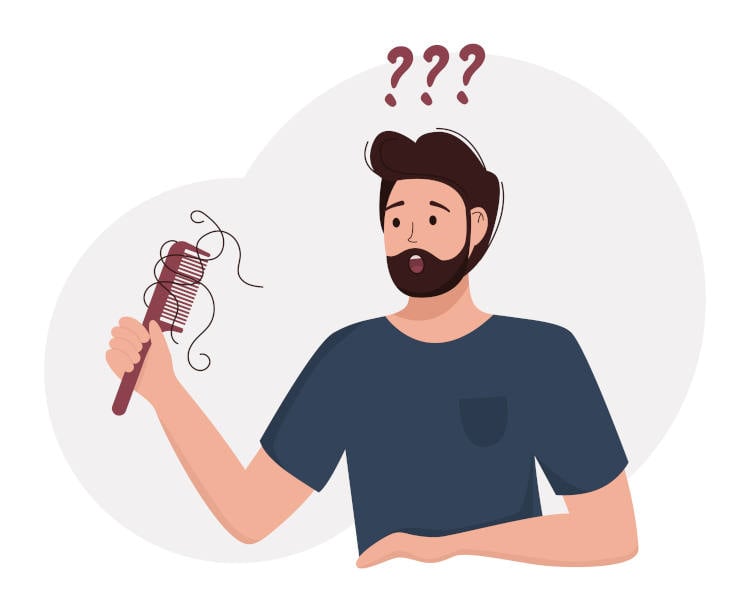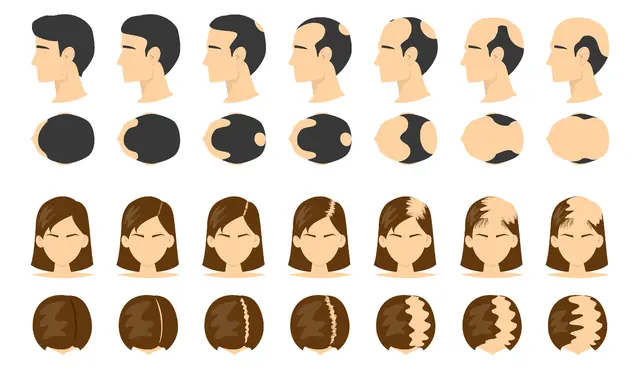
Hair Loss: Causes and Treatments
Alopecia is a general medical term for chronic, excessive hair loss. Some degree of hair loss is normal, and is an expected part of the natural hair growth cycle. On average, we each lose up to 100 hairs a day. However, if hair loss exceeds this amount, this is considered abnormal loss and warrants medical examination.
Alopecia comes in several different forms and can be caused by underlying, undiagnosed diseases, drugs and medication, or other factors. It affects people of all ages, genders and ethnic backgrounds. While there are many possible causes of alopecia, some are more common than others.
Summary
- What Are the Most Common Causes of Hair Loss?
- What Are the Different Types of Hair Loss?
- What Is an Alopecia?
- What Are the Signs of Hair Loss?
- What Are the Current Hair Loss Treatments?
- How Can I Prevent Hair Loss?
- Facing Hair Loss: Don’t Underestimate Your Emotional Well-Being
What Are the Most Common Causes of Hair Loss?
Hair loss and/or thinning hair is a far more common issue than people tend to realise. Anyone can lose hair, with this issue occuring across all genders, ages, and ethnicities. While it is important to speak to a medical professional to ascertain the root cause of your symptoms, these are some of the most common underlying issues:
- Thyroid problems: The thyroid gland is an integral part of the endocrine system, which keeps the body's hormones in balance. When this balance is disrupted, this can lead to loss of hair. Both hyperthyroidism (overactive thyroid) and hypothyroidism (underactive thyroid) can lead to thinning hair, as can autoimmune thyroid disorders like Hashimoto's disease and Grave's disease. In these cases, the loss of hair is diffuse and persists until the disease is treated with medication.
- Autoimmune diseases: Hashimoto's and Grave's are not the only autoimmine diseases that can cause hair loss, unfortunately. If the scalp itches and bald patches begin to appear on the scalp, initially small and then larger, it could be an autoimmune disease known as alopecia areata.
- Hereditary hair loss: If there is a family history of balding with age (androgenic alopecia, male-pattern baldness, and female-pattern baldness) this may occur gradually in predictable patterns as you get older.
- Cancer treatment: Cancer treatments must be aggressive in order to stop the spread. Unfortunately, this can cause a lot of stress in the body, impacting overall hair health. Both chemotherapy and radiotherapy damage hair follicles all over the body. Once the cancer is fought and the treatment is over, the hair can grow back.
- Medications: Hair loss often occurs months after treatment, which is why it is often not associated with the medication. Once the pharmaceutical product has left the body, hair usually grows back.
- Nutritional deficiencies: Hair follicles need a variety of vitamins and minerals in order to maintain peak health. A poor diet leads to dull hair and also loss of hair. Treatment is possible by modifying the diet and/or taking dietary supplements.
- Hormones: Hair health is highly affected by hormonal activity and a wide variety of hormones play a part in the normal function of the hair cycle. As a result, hormonal imbalances can result in hair loss.
- Stress: Stress alters the body’s hormonal balance. Significant and prolonged stress can lead to alopecia. Autogenic training and other stress reduction methods can help encourage the hair to grow back.
What illness causes hair loss?
Hair loss is a common symptom of many health conditions. In addition to the illnesses listed above, you may experience this symptom if you suffer from lupus, syphilis, tinea capitis (a fungal infection of the scalp) and more. The cause of your hair loss can also determine whether the loss is temporary or an issue that will persist. Therefore, it is crucial that you seek medical advice in order to reach a diagnosis of your condition before seeking treatment options.
What Are the Different Types of Hair Loss?
Few people realise that there are many forms of hair loss, each with their own appropriate courses of treatment. Before treating your symptoms, it is therefore important to understand what you're dealing with. This can only be done by consulting with a medical professional. Below, we have outlined some of the most common types of hair loss, their causes, and their symptoms.
What Is Alopecia?
Alopecia is a medical term that refers to many forms of temporary and permanent hair loss. It can be permanent or temporary, depending on the kind of alopecia you are suffering from. Common forms of alopecia include alopecia areata, alopecia totalis, alopecia universalis, alopecia barbae, cicatricial alopecia, and frontal fibrosing alopecia. Each of these conditions have different characteristics and there is no one-size-fits-all approach for treatnent. For example, here are some common types of alopecia and their respective courses of treatment:
- Androgenetic alopecia: Caused by a combination of genetic and hormonal factors, this form of permanent hair loss is chronic and is best treated with a hair transplant.
- Alopecia areata: Baldness caused by alopecia areata is typically acute but not permanent, meaning that patients suffering from this form of loss are not good candidates for hair transplants. Alopecia areata is an autoimmune disorder wherein the immune system attacks otherwise healthy hair follicles, resulting in round bald patches on the scalp, loss of eyebrows, and other loss of hair across the body.
- Traction alopecia: This form of loss is caused by tight hairstyles, use of tight wigs, weaves or hair extensions. Over time, the tension of these styles damages the hair follicles, causing hair to thin and fall out. Patients suffering from this form of alopecia are suitable candidates for a hair transplant using the DHI technique. Find out more about the types of alopecia here.
Female pattern baldness
Female pattern baldness, clinically referred to as androgenetic alopecia, is the most common type of hair loss in women. It can cause hair to gradually thin along the parting and crown with various levels of severity.
Age, hormone levels, and family history, as well as some medications and heavy periods, are among the contributing factors that cause female pattern baldness. There are different stages of androgenetic alopecia, and treatment options will largely depend on the individual patient's stage of loss and their desired outcome. A hair transplant is considered a potential option in most cases. Find out more about different types of female hair loss, diagnosis and treatments in our guide.
Male pattern baldness
Male pattern baldness is hereditary and specifically impacts males and people assigned male at birth. There are many factors that cause male pattern baldness including hormones, genetics and age.
Diagnosis of male pattern baldness involves your GP or specialist finding the cause of your symptoms, ruling out factors such as mental health, autoimmune conditions or diet as a factor.
This type of hair loss begins at the temples and progresses to the crown and middle of the scalp. It only affects the follicles at the front and top of the scalp, usually leaving hair at the back of the head and sides of the head unaffected. As a result, these unaffected areas can be used as donor sites in a hair transplant procedure, should that be a treatment option the patient wishes to pursue.
Can it be stopped?
Want to know how to stop male pattern baldness? DHT blockers such as Finasteride are considered a potential option, alongside maintaining a healthy diet, managing stress and avoiding smoking.
Minoxidil is a more common treatment, which is applied topically to the affected areas. The only solution with lasting results, however, is a hair transplant. Hair transplants for male pattern baldness are increasingly popular. If you’re worried about male pattern baldness, always gain diagnosis from a medical professional and find out about your treatment options.
Telogen effluvium
This type of hair loss is sudden and caused by stress, illness, hormonal imbalance or nutritional deficiency. It’s often temporary and usually treated with topical solutions. Again, to ascertain if your hair loss is temporary, speaking to a healthcare professional should be your first course of action.
What Are the Signs of Hair Loss?

The initial signs of hair loss depend on the kind of alopecia at play and the sex of the patient; the degree and pattern of hair loss can differ greatly between men and women. In the case of androgenic alopecia, the loss of hair begins with a gradual thinning which, over time, results in baldness due to excessive loss from multiple areas of the scalp.
For women, this is typically seen with the broadening of the hair parting, or a receding hairline. For men, a receding hairline is one of the first signs of hair loss, with the areas around the temples gradually moving backwards and, in many cases, a bald spot forming at the crown of the head.
Other signs of hair loss, which could indicate conditions other than androgenic alopecia, may include patchy bald spots, and some may see circular areas of balding on their scalp, eyebrows or beard. Sudden loosening of hair is another common sign. This can be linked to a physical or emotional shock where handfuls of hair fall when washing or combing the hair.
Full body hair loss (often caused by medical treatments such as chemotherapy), can mean hair is lost in all areas of the body.
What Are the Current Hair Loss Treatments?
Treatment for hair loss will vary depending on the underlying cause. Some types of hair loss are temporary and require no treatment, others may need lifestyle changes, or medication, or a more permanent solution such as a hair transplant.
Medications for hair loss
- Minoxidil: This is the number one topical treatment for hair loss. Minoxidil is a medication for high blood pressure that has the side effect of stabilising the rate of hair shedding. However, stopping or pausing your use of minoxidil means that your symptoms will return.
- Finasteride: This is also a common medication used to treat baldness issues. The active ingredient promotes new hair growth with regular use. However, many patients experience side effects such as psychological and/or sexual disorders. Due to the fact that it can cause birth defects, it is not prescribed to women.
- PRP therapy: This course of treatment is useful in cases of poor circulation and lack of essential nutrients to the scalp. For this, blood is drawn from the patient and enriched with nutrients by passing it through a centrifuge. The preparation is then injected directly onto your scalp and feeds the weakened hair follicles with essential vitamins and minerals.
Hair care
Hair care products may be helpful for hair loss. Prioritise shampoos and conditioners that are formulated with ingredients specifically designed to protect the scalp.
Regular scalp massages (with or without accessories) complement the effectiveness of treatments. Take a look at the specialist hair care products in our online hair care shop to find a targeted solution to best suit your needs.
Hair transplants
Since the late 1990s, the development of medical treatments for male or female pattern baldness has seen a great deal of progress. Current methods are being adapted to best suit the patient's condition and desired results.
In some cases, hair density is permanently lost in part or all of the head. In these cases, a hair transplant is the only appropriate option, should the patient meet all the necessary criteria. Here at Elithair, we offer hair transplants for a range of hair loss conditions. Specialising in techniques like FUE and DHI, our specialists will analyse your specific needs and provide you with the best option for you.
How Can I Prevent Hair Loss?
There are a number of things you can do to help protect your hair health:
- Choose hairstyles that are gentle on your hair roots and take care when detangling to prevent pulling out hair.
- Protect your hair from sun damage by wearing appropriate head gear outdoors.
- Avoid using hair products that contain harsh chemicals or alcohol.
- Make sure you get enough exercise and are eating a healthy diet.
- Explore techniques to lower your stress levels and avoid continuous stress that becomes a major risk to the good balance of hair growth.
- Avoid smoking. Smokers suffer from hair loss at a rate far higher than non-smokers. Nicotine contains many toxic substances that hinder blood circulation and leads to undersupply of nutrients to hair follicles.
If you are concerned about hair loss, talk to your doctor or a hair specialist. They can help you identify its cause and recommend treatment options.
Facing Hair Loss: Don’t Underestimate Your Emotional Well-Being
Hair loss can be a difficult experience to live through. There are several ways to cope and to counter the emotional suffering it causes. For starters, it is worth talking to someone you trust about your feelings.
Seek detailed information about your condition. The more you know, the less power alopecia will have over your quality of life. Focus on the things that influence you positively. In support groups and online forums, you can share your experience anonymously or exchange information on treatment options.
Support groups
To regain your self-esteem, therapy can also be helpful and necessary if your hair loss leads to depression. Here are a selection of support groups for hair loss sufferers:
- Alopecia UK is a national charity that offers support groups for people with alopecia. These groups are specifically for people with alopecia areata, which causes round, bald patches to appear on the scalp.
- Hair Loss Experiences forum is a forum specialised for people suffering from hair loss.
Hair loss can be a challenging experience, but there are resources available to help you cope. By talking to someone you trust, getting informed, and focusing on the positive, you can start to feel better about your alopecia.
If you have any other questions about our services and how Elithair can help you with your hair loss, contact one of our experts today to start your free and non-binding hair assessment.
FAQs
What are the different stages of male pattern baldness?
Male pattern baldness is commonly classified using the Norwood scale, which ranges from stage 1 (no significant hair loss) to stage 7 (severe hair loss with only a band of hair remaining around the sides and back of the scalp). It has been developed in order to take more specific hair types into account.
What are the different stages of female pattern baldness?
Female pattern baldness is often classified using the Ludwig scale, which ranges from stage 1 (thinning on the top of the head) to stage 3 (extensive thinning with a bald spot at the crown). .
How quickly can hair loss progress through these stages?
The progression of hair loss varies widely among individuals and can depend on factors like genetics, health, and lifestyle. It can take several years or even decades for hair loss to progress through all stages.
Can treatments like Minoxidil or Finasteride stop the progression of hair loss at any stage?
Yes, treatments like Minoxidil and Finasteride can help slow down or even halt the progression of hair loss if used consistently and started early in the hair loss process. Unlike hair surgery, those treatments are not permanent and hair will start falling again if those are stopped.
Are there specific signs to look for that indicate a transition from one stage to the next?
Signs include increased thinning or shedding, noticeable changes in hairline shape, the appearance of bald spots, and overall reduced hair density.
Can lifestyle changes impact the progression of hair loss through these stages?
Yes, maintaining a healthy diet, managing stress, avoiding smoking, and using gentle hair care practices can positively influence hair health and potentially slow the progression of hair loss.


